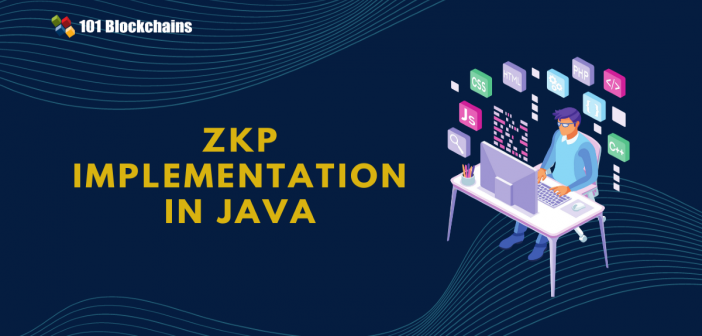The following discussion attempts to shed some light on ZKP java implementation while dissecting its significance.
In recent years, we have witnessed radical changes and transformations in the world of technology with introduction of blockchain. The new technology has enabled large banks and firms to access and use personal information for delivering personalized experiences. As a result, users have provided express permission for mechanisms that use sensitive information pertaining to them.
However, blockchain technology offered a credible solution for ensuring integrity of personal information of users in the financial services ecosystem. On the other hand, blockchain is not as decentralized and anonymous as it is believed to be. Therefore, zero knowledge proof implementation came to the forefront of encryption technologies in the modern era.
Recently, there has been substantial growth in demand for information about ZKP and the approaches for their implementation. With a better understanding of the definition and working of ZKP, readers can understand the ZKP implementation in Java effortlessly.
Excited to understand the core concepts of zero-knowledge proofs, Enroll Now in Zero Knowledge Proofs (ZKP) Masterclass
What Is ZKP (Zero Knowledge Proof)?
Before diving into an understanding of ZKP java implementation, it is important to know what the ZKP could achieve. It serves as an exceptional and counter-intuitive concept in cryptography that emerged in a discussion about interactive proof systems. A Zero Knowledge Proof or ZKP is basically a method of proving to another person about knowing some fact without disclosing the fact to them.
As a result, the other person in a transaction does not have any idea about the secret fact. For example, if you know about a certain unique recipe, then you can convince another person that you know the ingredients without actually having to disclose the recipe. All you are doing is proving the truth of a statement without giving any knowledge regarding the proof.
Working of ZKP
Now, the next important aspect that you must verify how it works before learning about Zero Knowledge Proof based blockchain implementation. In order to understand how zero knowledge proof works, learners must understand the three different roles of users in ZKP. The three different roles in the zero-knowledge proof system include the creator, the prover, and the verifier.
In the case of certain zero knowledge systems, users don’t need a creator. However, a trusted creator can spell a huge difference for users in terms of addressing certain significant security considerations. Let us reflect on the functionality of these roles to understand the foundation for ZKP java implementation.
-
Creator
The creator in ZKP systems is generally the entity responsible for setting up the system. It is involved in deciding the objectives of designing the system. Furthermore, a single instance of ZKP system can create proofs according to a particular type. The most important aspect of creator in ZKP is the creation of the system with some randomness.
Creator helps in convincing users in the ecosystem about the lack of any randomness in establishing a zero-knowledge system. The applications of creator in Zero Knowledge Proof implementation result in two keys, known as the verification key and the proving key. The two keys are then distributed among users on the basis of their roles. These keys are different that private and public keys.
Excited to learn about the differences between Public and Private Keys? Check here Public vs. Private Keys Presentation now!
-
Prover and Verifier
The next two prominent roles in the day-to-day use of zero-knowledge proof systems include the prover and verifier. The prover would have to receive the proving key, with the ability to creating specific proofs regarding the type defined by the creator. The verifier would have to receive the verification key alongside verifying the correctness of specific proof.
It is also important to note that a single user can serve the roles of prover and verifier with different keys. So, how does one go about with proofs and verification in a ZKP java implementation? The prover can create proof by using the proving key and related instance parameters such as private and public inputs.
Prover employs a random process such that repeating the process with same inputs would result in different proofs. Then the verifier would take the proof, following which the verification key includes the public inputs and other feeds into a verifier algorithm. The verifier algorithm is responsible for deciding the validity of the proof for the concerned input.
Users should note the lack of randomness in the process, thereby resulting in similar results every time, just like in the case of cryptographic proofs. In the rarest of cases with negligible probability, you can find some concerns of randomness with ZKP implementations. This process is more or less similar to consensus algorithms that are used in blockchain technology.
Build your identity as a certified blockchain expert with 101 Blockchains’ Blockchain Certifications designed to provide enhanced career prospects.
Bulletproof Implementation
With a clear understanding of what ZKP is and how it works, you can move towards ZKP java implementation now! The most popular ZKP implementation is bulletproof implementation. Bulletproof ZKP implementations don’t require any trusted setup and support Java implementation with a massive and flexible library. The process is far more simple and easier to do than building a blockchain app as they require a more flexible library.
The Java library designed specifically for distributed zero knowledge proof implementation is DIZK. The library helps in implementation of distributed interpolation or evaluation of polynomials, multi-scalar multiplication, and Lagrange polynomial computation. The arithmetic subroutines are highly scalable and offer the foundation for DIZK library to enable a distributed ledger technology based ZK-SNARK proof system.
The ZK-SNARK proof system can help in ensuring verifiable computations amounting to billions of logical gates in terms of capacity. Therefore, the DIZK library can support ZKP java implementation with considerably higher scalability in comparison to the previously existing state-of-the-art solutions.
A deeper reflection on the zero-knowledge proof implementation with Java library would deal with various factors. Readers have to develop knowledge about the directory structure alongside a detailed impression of the build guide. In addition, readers should also learn about profiler and benchmarks associated with the ZKP implementation on Java. So, let us start with a directory structure for ZKP java implementation before diving into an overview.
Directory Structure of ZKP Implementations
The directory structure of implementation of ZKP in java library is the foremost highlight for understanding ZKP implementation. Here are the important components that you can discover in the directory structure for zero knowledge proof implementation.
“src” is the Java directory tailored for source code and unit tests. Then, the “main/java” component in the ZKP implementation directory is the Java source code. The Java source code includes some of the significant modules as follows,
- The ‘algebra’ module deals with fields, multi-scalar multiplication, groups, FFT, and elliptic curves.
- The ‘common’ module is responsible for standard arithmetic utilities and Spark computation functionalities.
- The ‘reductions’ module is an internally applicable module for ensuring reductions among languages.
- The ‘configuration’ module in zero knowledge proof implementation directory structure helps in tailoring configuration settings for a specific Spark cluster.
- The ‘zk_proof_systems’ module enables serial as well as distributed implementations for ZKP systems.
- The ‘bace’ module is suitable for the purpose of batch arithmetic circuit assessment.
- The ‘relations’ module in the directory structure ensures the facility of interfaces for expressing the relations between witnesses and instances in the form of different NP-complete languages.
- The ‘profiler’ module in the directory structure is responsible for profiling the infrastructure for ZKP systems.
Another important addition to the directory structure for ZKP java implementation refers to “test/java” component. It refers to the Java unit tests tailored for modules and infrastructure offered for the ZKP implementation.
Wondering about the role of Zero Knowledge Proofs in Blockchain? Read here How Zero Knowledge Proofs Are Changing Blockchain?
Overview of ZKP Java Implementation
As evident already, the DIZK library enables a distributed ZKP system with options for proving and verification of computation integrity in zero knowledge, with higher scalability. ZKP can eliminate a lot of the disadvantages of blockchain using the features. Prover having acquaintance with a witness for an NP statement could create a short proof, verifying truth in the NP statement. Any individual could verify the proof in a zero knowledge proof implementation with the following properties.
- The verifier does not learn anything other than the truth of the statement, thereby ensuring ‘zero knowledge’ characteristic.
- Succinctness property of the proof is evident in the small size and cost-effectiveness for verification.
- The ‘soundness’ of the proof is evident in the computational integrity of the proof, generally referred to as an argument.
- The ‘proof of knowledge’ aspect in the proof helps in ensuring that it verifies the truth of the NP statement alongside the prover’s knowledge about the reason for the truth.
- The ‘non-interactivity’ property in ZKP java implementation shows that the proof does not need any to-and-fro interaction among verifier and prover.
Applications of Zero Knowledge Proof Java Implementations
All of these properties clearly indicate towards a ZK-SNARK in zero knowledge proof implementation. So, what are the potential blockchain usage areas where you can use the DIZK-based ZKP java implementation? Users can avail of Java-based implementations with Apache Spark through DIZK in the following applications.
-
Proof Systems
The foremost applications of ZKP implementation are evident in proof systems. You can opt for a serial and distributed preprocessing ZK-SNARK for Rank-1 Constraint Systems, with an NP-complete language having features for arithmetic circuit satisfiability. Another application of ZKP implementation in proof systems refers to a distributed Merlin-Arthur proof system. The Merlin-Arthur proof system can help in evaluation of arithmetic circuits on input batches.
-
Scalable Arithmetic Applications
The second important application of ZKP implementation refers to the arithmetic applications with higher scalability. The zero knowledge proof implementation in scalable arithmetic applications include blockchain applications for serial and distributed Radix-2 fast Fourier transform (FFT). They can also serve applications of serial and distributed multi-scalar multiplication. In addition, ZKP implementations could also help in ensuring functionalities for serial and distributed Lagrange interpolation.
-
Applications Based on ZK-SNARKs
In addition, DIZK also serves effectively for applications by leveraging the ZK-SNARK with the important applications for authenticity of photos for three transformations such as crop, blur, and rotation. The ZKP implementations could also ensure integrity of machine learning models, having support for covariance matrices and linear regression.
Enterprise courses can offer you better context to ZKP. Enroll in our blockchain courses and take your blockchain career to the next level.
Build Guide for ZKP Implementation
Now, the next important aspect in the ZKP java implementation refers to the build guide. The build guide provides a detailed impression for implementing the zero-knowledge proof systems. First of all, it is important to know about the dependencies used prominently in ZKP java implementations.
The important dependencies in the DIZK library include Java SE 8 and above, Apache Maven, Spark SQL 2.10, Spark Core 2.10, Google Java Format, and JUnit 4.11. In addition, users would also need to fetch ‘spark-ec2’ through Git submodules as one of the dependencies. Before diving into the build guide thoroughly, it is important to find out reasons to use Java for ZKP implementation.
Java can be a fitting choice for zero knowledge proof implementation with its enriched set of features to enable object-oriented programming. In addition, it can also support the control over execution of ZKP implementation in a highly refined manner. In addition, purely native Java execution can be a promising advantage over the complexities associated with speed of other languages.
Installation Process
Users could start with the ZKP java implementation process through the installation process.
- The installation process begins with cloning of a repository followed by entering the repository working directory as follows,
git clone https://github.com/scipr-lab/dizk.git
cd dizk
- The next important process in the installation refers to fetching the dependency modules with the following code,
git submodule init && git submodule update
- Then, you can compile the source code in the final step with the following command,
mvn compile
Docker
Users should also set up Docker for zero knowledge proof implementation as follows,
cd your_dizk_project_directory
docker build -t dizk-container .
docker run -it dizk-container bash
Unit Testing
The next step in the implementation refers directly to the unit tests. Users can access unit tests in the library for all the modules offered in library. You can run the tests by using the following command,
mvn test
Profiler
The importance of ‘Profiler’ in the ZKP java implementation routine directly refers to the use of Amazon EC2. The profiler is able to use Amazon EC2 for benchmarking the performance of serial as well as distributed ZKP systems and the associated primitives. The profiler leverages ‘spark-ec2’ for management of cluster compute environment as well as a collection of scripts offered for launch, shutdown, and profiling. Let us take a look at the different aspects related to the profiler in ZKP implementation through a Java library.
Spark EC2
DIZK leverages the ‘[email protected]’ for managing the cluster compute environment. ‘spark-ec2’ is a promising instrument for launching, maintenance, and termination of Apache Spark clusters on Amazon EC2. You can use the following commands for setting up ‘spark-ec2’ in a zero knowledge proof implementation.
git clone https://github.com/amplab/spark-ec2.git
cd spark-ec2
git checkout branch-2.0
pwd
Users should also remember the location of the directory for ‘spark-ec2’ for providing the environment variable for scripts in following stages of ZKP java implementation.
Script Profiling
The actual ZKP implementation process starts with profiling scripts. Users must set up the environment variables needed for initialization of the profiler in init.sh. In addition, the profiling infrastructure also needs access to a specific AWS account access key as well as a secret key.
- Users can then begin the profiler by running the following command,
./launch.sh
- The launch script leverages ‘spark-ec2’ and environment variables for setting up the initial cluster environment. The process can help consumers for around 20 to 30 minutes, according to the selection of cluster configuration. After completing the launch process, users must upload the DIZK JAR file to the master node followed by the SSH into cluster by running the following commands,
./upload_and_login.sh
- After logging in successfully to the cluster, users have to navigate to the ‘scripts’ folder uploaded already. Now, you have to set up the initial cluster environment for your ZKP java implementation by using the following commands,
cd ../scripts
./setup_environment.sh
- As a result, users can get a logging directory for Spark events alongside installation of the required dependencies. Once you have set up the cluster environment completely, you must allocate suitable parameters for benchmarking in ‘profile.sh’ followed by running the command below to start profiling.
./profile.sh
Benchmarks
The final aspect in understanding a zero knowledge proof implementation with java libraries refers to benchmarks. Generally, the distributed implementation of ZKP systems’ setup and power is important for testing efficiency of the implementation. In addition, instance size is also a reliable indicator of the number of constraints for an R1CS instance. Needless to say, instance size is not related to blockchain size.
DIZK vs libsnark Comparison
Generally, the largest instance size is measured as a power of 2 with support for different implementations. The ZKP java implementation variants supporting the largest instance size include,
- Distributed implementation of Groth’s protocol in DIZK
- Serial implementation of the PGHR protocol in libsnark
- Serial implementation of Groth’s protocol in libsnark
The use of additional executors helps in supporting larger instance sizes, with support for billions of constants with an adequately more number of executors.
Distributed ZK-SNARKs
In the case of a distributed ZK-SNARK, the benchmarks for ZKP java implementation focus on running time of setup and prover. The benchmark also considers increases in a number of constraints alongside the number of executors. The conclusion of the benchmarking indicates two prominent outcomes such as,
- In the case of a specific instance size, running times can decrease in an almost linear fashion, thereby showing parallelization across a varied range of many executors.
- In the case of a particular number of executors, the running times can increase in an almost linear fashion, which showcasing scalability across a wide variety of instance sizes.
Conclusion
So, you can clearly notice the different intricacies of ZKP java implementation with considerable insights on the process. Generally, Java is a preferred language for ZKP implementation on the grounds of its rich set of features including enterprise blockchain. It enables object-oriented programming functionalities alongside offering considerable flexibility in ZKP implementation.
Without the need for creating the initial setup, zero knowledge proof implementation by leveraging Java can provide exceptional speed. In addition, the ease of creating ZKP implementations with Java-based libraries through a modular approach can serve promising advantages. If you want to learn more about ZKP implementations, then join the ZKP Masterclass right now!
*Disclaimer: The article should not be taken as, and is not intended to provide any investment advice. Claims made in this article do not constitute investment advice and should not be taken as such. 101 Blockchains shall not be responsible for any loss sustained by any person who relies on this article. Do your own research!






